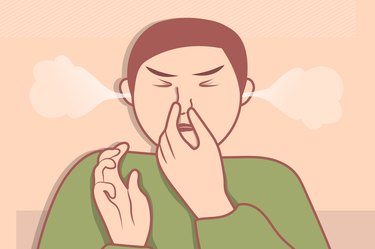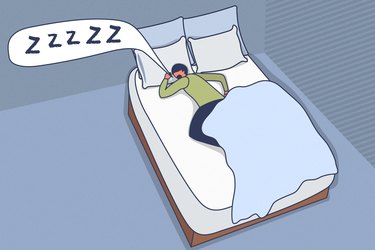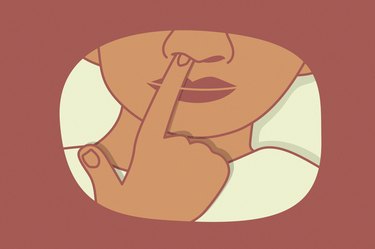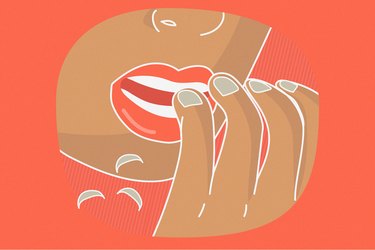
There was a time when sneezing in certain public situations (like in a movie theater or during a speech) might've been considered bad manners. Now, even the tiniest achoo can make people turn heads. So when the urge starts to strike, should you just...hold it in?
Sneezing is the body's way of clearing irritants like germs, pollen or dust out of the nose and throat. And it can be pretty powerful, expelling tens of thousands of droplets from your nose at up to 100 miles per hour, according to the American Lung Association. (Although some people have a less-powerful sneeze reflex, which may lead them to sneeze many times in a row in order to expel the irritant.)
Video of the Day
Video of the Day
Harnessing that kind of illness-spreading potential can, understandably, make you feel a little uneasy. So is there any downside to trying to keep those sneezes inside?
Turns out, holding in a sneeze does come with some potential negative side effects, and some of them could be serious. Closing off your airway during a sneeze can put up to 20 times more pressure on your airways compared to simply letting out the sneeze, per a May 2019 review in the American Journal of Rhinology & Allergy.
Here are the reasons why stopping that sternutation (that's medical-speak for sneeze) could be a bad idea and what you should do instead.
1. It Could Make Your Chest Hurt
Withholding the force of your sneeze might lead to a feeling of uncomfortable fullness in your chest.
"You're putting pressure on your diaphragm, the muscle in the chest that helps us breathe," explains Jason Abramowitz, MD, an otolaryngologist with ENT and Allergy Associates in Oradell, New Jersey. "You might also experience pressure in the chest, in the ribs."
It's not dangerous, but it might not feel too good.
2. It Might Rupture Your Eardrum
Burst eardrums are a real — though unlikely — possible effect of holding in a sneeze.
"Our nose and ears are connected by the eustachian tubes," Dr. Abramowitz says. "If you hold in a sneeze, there would be increased pressure in the nose, which will flow to the ear through the eustachian tubes, which could lead to trauma in the eardrum."
3. It Could Lead to an Ear Infection
Sneezing because you have a cold? It's possible that the virus- or bacteria-filled mucus could travel from your nose, through the eustachian tubes, and into your ears, according to the Cleveland Clinic. That could set the stage for a middle ear infection.
4. It Might Burst a Blood Vessel
Sneezes exert a lot of pressure, and trying to hold that back could cause a capillary in the eyes, nose or eardrum to burst.
"You might see a red spot on the eyeball or even have a small nosebleed," Dr. Abramowitz says.
5. It Could Cause Other, More Serious Problems
OK, so holding in a sneeze could potentially make you uncomfortable or cause a minor illness or injury. But is anything life-threatening going to happen?
There are published reports of forceful sneezes causing aneurysms, or bulging blood vessels in the brain, like this one published in the January 2015 issue of Case Reports in Neurological Medicine.
Violent sneezing fits have also been tied to laryngeal or throat fractures, per a September-October 2021 case report in the American Journal of Otolaryngology.
But both of these problems are highly, highly unlikely, Dr. Abramowitz says.
Related Reading
What to Do Instead
It's better to let your sneezes out instead of holding them in, Dr. Abramowitz says.
To keep your sneeze from turning into a super-spreader event, the Centers for Disease Control and Prevention (CDC) recommends covering your mouth and nose with a tissue. After that, discard the tissue and wash your hands thoroughly with soap and water or use hand sanitizer.
If a tissue isn't available, your next best bet is to sneeze into your elbow (and move away from others while you do so, if possible).
And if you absolutely have to hold in your sneeze? Try not to hold your nostrils too tightly. "This will lead to higher pressure in the nose and increase discomfort," Dr. Abramowitz says. (Still, wash your hands afterwards too!)
So, How Bad Is It Really to Hold in a Sneeze?
You should let your sneezes out whenever possible, Dr. Abramowitz recommends. Holding in a sneeze will probably be a little uncomfortable, and it's possible you could get hurt or even develop an ear infection.
"While the risks of severe injury are very low, it's often more comfortable and safer to let the sneeze out," Dr. Abramowitz says.
- American Lung Association: "How Fast Is a Sneeze Versus a Cough? Cover Your Mouth Either Way!"
- American Journal of Rhinology & Allergy: "The Dangers of Sneezing: A Review of Injuries"
- Cleveland Clinic: "Trying to Hold That Sneeze In? Better Not if You Know What’s Good for You"
- Case Reports in Neurological Medicine: "Subarachnoid Hemorrhage Secondary to Forceful Sneeze"
- American Journal of Otolaryngology: "Considerations and Management of a Laryngeal Fracture after Sneezing"
- Centers for Disease Control and Prevention: "Coughing and Sneezing"
Is this an emergency? If you are experiencing serious medical symptoms, please see the National Library of Medicine’s list of signs you need emergency medical attention or call 911.




